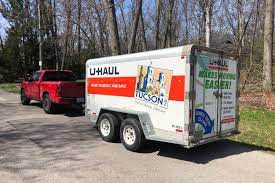 Relocating to a new city is both a scary but exhilarating experience. However, the idea of moving without a job can be daunting for many. This post provides some essential tips and strategies on how to move across the country without a job, ensuring a seamless transition to your new life.
Relocating to a new city is both a scary but exhilarating experience. However, the idea of moving without a job can be daunting for many. This post provides some essential tips and strategies on how to move across the country without a job, ensuring a seamless transition to your new life.
Table of Contents
1. Understanding the Challenge
Moving without a secure job can seem intimidating, but it’s more common than you think. Various reasons prompt individuals to take this leap, such as better opportunities, starting anew, or personal motivations.
It’s crucial to appreciate the challenges and prepare strategically to overcome them. And always doing a little job searching ahead of time to secure a new job is always ideal, but not always possible.
The Reality of Moving without a Job
You might need to make sacrifices, like living on a stringent budget or compromising on your ideal neighborhood. However, with the right planning and a strong will, achieving a smooth transition is within reach, especially if you start the job search process right away or preemptively.
Strategic Steps for a Smooth Transition
To ensure a hassle-free move, prioritize your job search, commit to saving, and live below your means. It’s essential to be financially savvy and learn budgeting basics to manage your finances effectively.
2. Conducting Preliminary Research
Before you decide to move, it’s vital to do your homework. This involves understanding the job market, job openings, cost of living, and lifestyle in your new city.
Analyzing the Job Market
Identify the major employers and growing industries in your target city. You can use resources like LinkedIn, job boards, or business journals for this research.
Exploring the Lifestyle and Cost of Living
Consider your hobbies and interests when choosing your new city. Look into the activities, attractions, and lifestyle trends that the city offers. Also, examine the cost of living, including rent, utilities, groceries, and transportation.
3. Building Your Network

Networking is a powerful tool when moving to a new city without a job. Start building connections with professional associations, industry groups, friends, and acquaintances in your target city.
Leveraging Social Media
Platforms like LinkedIn can be instrumental in expanding your network. Join groups related to your industry and engage in discussions.
Attending Networking Events
If possible, attend networking events in your new city. These events provide opportunities to meet industry professionals and potential employers.
4. Financial Preparation
Before you move, it’s crucial to ensure you have sufficient savings to cover your living expenses for at least three to six months.
Saving for the Move
Relocating can be expensive. Calculate the potential costs, including movers, travel expenses, and apartment deposits.
Budgeting for Living Expenses
Estimate your monthly expenses after the move. This should include rent, groceries, utilities, and transportation. Aim to save enough to cover these costs for a few months without an income.
5. Job Hunting Strategies
Start applying for jobs as soon as you decide to move. It can take weeks or even months to secure a job, so it’s essential to begin this process early.
Preparing Your Resume
Update your resume and cover letters to suit the job market in your new city. Make sure to highlight the skills and experiences that make you an ideal candidate.
Applying for Jobs
Apply for jobs on various job boards and company websites. You can also reach out to recruiters and hiring managers directly.
6. Finding a Place to Live
Securing a place to live before you move can make the transition smoother. Use online platforms to search for available apartments or houses within your budget.
Renting an Apartment without a Job
Finding a rental without a job can be challenging. However, demonstrating that you have enough savings to cover rent for several months can reassure potential landlords.
Consider Short-term Rentals
If securing a long-term lease is difficult without a job, consider short-term rentals or sublets. These options provide you with a place to stay while you look for a job and a more permanent home.
Moreover, they offer more flexibility and fewer commitments, which are ideal when you’re still exploring the city and job market. Plus, living in different neighborhoods can give you a taste of local life and help you decide where you’d eventually like to settle. Finally, short-term rentals are often furnished, saving you the hassle and cost of moving or buying furniture.
7. Consider Freelancing or Part-Time Jobs
While looking for a full-time job, consider freelancing or part-time jobs to earn some income. These opportunities can also help you build your network in your new city.
Through freelancing or part-time jobs, you not only secure a source of income during your transition but also gain a chance to interact with locals. This can lead to deeper connections and potentially, more permanent job opportunities.
Additionally, these jobs can introduce you to the city’s culture, work ethics, and professional landscape. They serve as flexible, rewarding avenues for integrating into your new environment while maintaining financial stability.
8. Settling Debts
Before moving, make sure to settle any outstanding debts or payments. Having a clean slate will help you focus on your new beginning.
9. Maintaining Old Connections
As you build new connections in your new city, don’t forget to maintain your old ones. These relationships can provide valuable support during your transition.
Relocating to a new city often comes with the excitement of new connections and experiences. However, amidst all these new beginnings, it’s essential not to forget about the old connections you’ve fostered over the years. These long-standing relationships, steeped in shared experiences and mutual understanding, hold immense value and can be a vital source of support during your transition.
They can offer comfort in times of homesickness, provide objective advice when facing challenges, and even help you network in your new city. This balance between the old and the new helps in maintaining a strong emotional support system, creating an easier transition to your new environment.
10. Preparing a Backup Plan
Having a backup plan can provide peace of mind. Consider what steps you would take if things don’t go as planned, such as returning to your old city or seeking alternative job opportunities like a part time job.
Relocating to a new city without a job can be a thrilling adventure. With careful planning, strategic savings, and a robust network, you can navigate this journey successfully. Remember, the key is to remain optimistic and resilient, even when facing challenges. Enjoy the journey and embrace the opportunities that come your way!
To sum up, moving to a new city without a job lined up is a bold step. It requires strategic planning, financial preparation, and a proactive approach to job hunting. However, with the right tools and mindset, it can open up a world of opportunities and a fresh start in your career. Regardless of the challenges that might come your way, remember that every step is part of your unique journey. Working on building a professional network for career advancement and hopefully to find a full-time position should be a goal but try and stay optimistic and a job offer should come through.
Keep an open mind, stay positive, and embrace the adventure that awaits!




